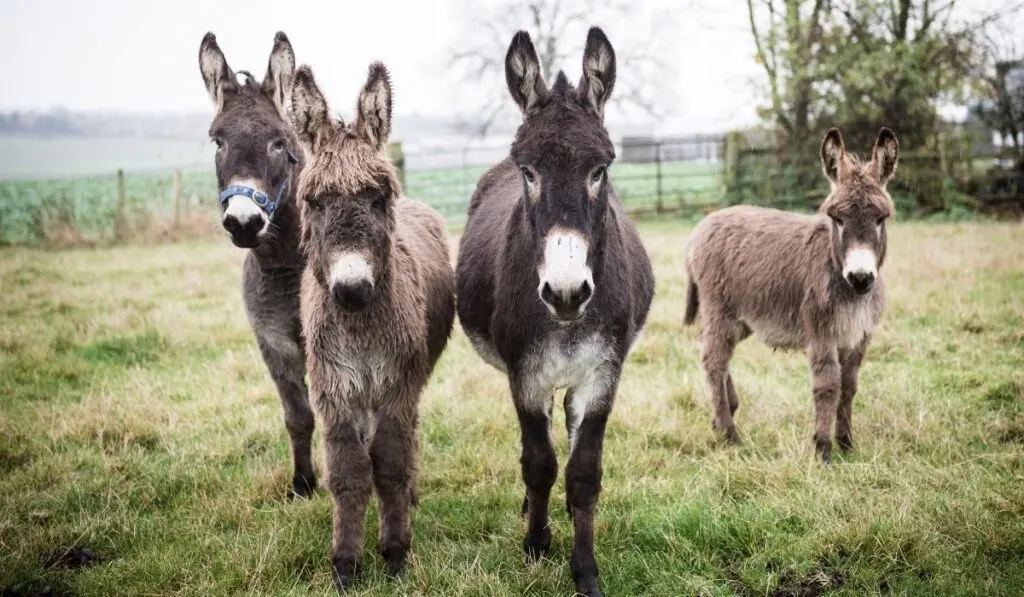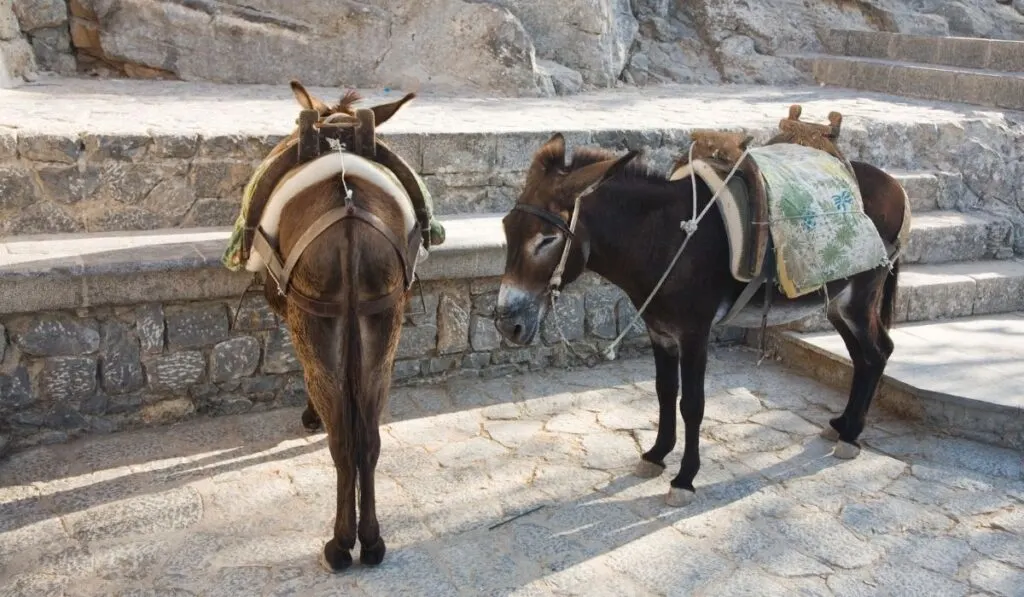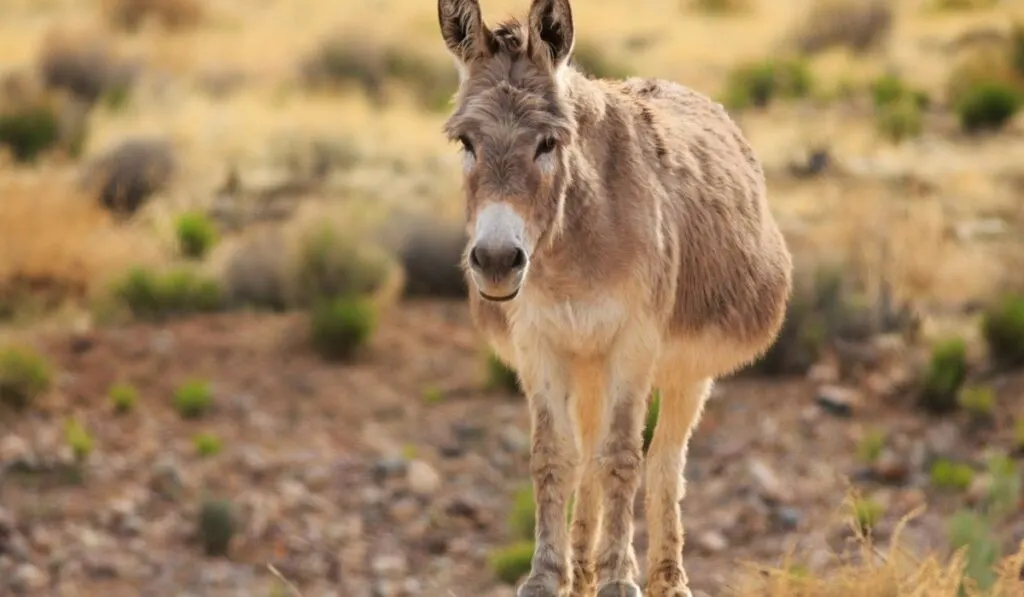Donkeys make great additions to almost any farm since they not only make great pets, they can also be fantastic guard animals for smaller livestock. They do vary substantially in size, however, particularly when it comes to their weight.
A donkey can weigh anywhere from 200 to 1300 pounds and donkeys are classified primarily by their size, not by their breed.
In the US, donkeys are considered to be either miniature, standard, or mammoth. Miniatures are the smallest donkeys, while the mammoths are the largest.
Understanding how much a donkey weighs is important for farm owners wanting to add a donkey to their ranch. This information will help them decide which type of donkey to get based on how big it is expected to grow.

Table of Contents
How Much Do Donkeys Weigh?
Since a donkey’s weight can vary so greatly depending on the type of donkey in question, it is vital to learn about each of them. Here are the three size classifications of donkeys in the US and how much they tend to weigh.
Miniature
Miniature donkeys stand between 30 inches to 36 inches tall and usually weigh 400 pounds or less. These donkeys are ideal for pets or farm companion animals for lonely goats, sheep, pigs, and miniature horses.
Miniature donkeys can be ridden by small children but they cannot withstand the weight of an adult.
The smallest miniature donkey in the world lives in Florida and is only 25.29 inches tall. Its exact weight is unclear, but it probably weighs less than 200 pounds.
Standard
Standard size donkeys stand between 36 to 56 inches at their shoulders and weigh more than 400 pounds but usually far less than 900 pounds. Standard female donkeys top out at 54 inches, while male standards can be up to 56 inches tall.
Standard donkeys are often put to work as guard animals for livestock like goats, sheep, and cattle.
These donkeys make excellent pack animals as well as pets. Standard donkeys can be ridden by children and some smaller-sized adults.
Mammoth
Mammoth donkeys stand at least 54 inches tall or more and weigh from around 900 to 1300 pounds. These donkeys are often utilized for draft and farm work.
The largest donkey on record, Romulus, is an American Mammoth donkey that weighs 1300 pounds.
Mammoth donkeys are often used to breed with horses to produce mules, the hybrid offspring of the pair. They are close in height to a small horse, around 14 hands tall or more.
Mammoth donkeys are the best donkeys for riding since their size allows them to carry the weight of a child or an average-sized adult.

How Much Weight Can Donkeys Carry?
Donkeys are a lot like horses when it comes to how much weight they can carry. The rule of thumb for both is that they can safely carry up to 20% of their own body weight.
This means that a miniature-sized donkey can carry around 50 to 80 pounds depending on its exact size. A standard-sized donkey weighing about 600 pounds would be able to carry up to 120 pounds safely.
Mammoth donkeys can carry at least 180 pounds if they weigh at least 900 pounds themselves. Donkeys can pull significantly more weight than they can carry.
How Much Do Donkey Foals Weigh?
The weight of donkey foals varies greatly depending on the size classification of the parents. Miniature donkey foals usually weigh somewhere around 18 to 25 pounds at birth, sometimes even less.
Standard donkey newborns typically weigh between 19 and 30 pounds while mammoth donkey foals can weigh even more, up to 10 percent of their mother’s total weight.
| Weight Range (adult, pounds) | Height Range (inches) | Foal Weight Range (pounds) | Carrying Capacity (dependent on the animal’s weight) | |
| Miniature | 200-400 | 25.29-36 | 18-25 | Up to 80 pounds |
| Standard | 400-900 | 36-56 | 19-30 | Up to 180 pounds |
| Mammoth | 900-1300 | >54 | >30 | Up to 260 pounds |
How To Calculate A Donkey’s Weight
Occasionally, you will need to know your donkey’s weight to accurately measure things including medicine and food supplements. Here are four ways to calculate a donkey’s weight.
1. Invest in a livestock scale for your farm.
Livestock scales are expensive, so they are only cost-effective if you have a whole herd of animals that need to be weighed regularly. Most livestock scale setups cost at least $2,500 or more.
2. Take the donkey to a large animal veterinarian.
Large animal veterinarians will have scales at their offices that can accommodate large animals like donkeys.
3. Check around local farms.
Ask local farm owners that have livestock if they happen to have a large animal scale at their farm that you can weigh your donkey on.
4. Use an equine weight calculator to calculate your donkey’s weight easily.
Measure the donkey’s shoulder height, chest circumference, and body length. Find an equine calculator online to plug in the measurements and calculate the donkey’s estimated body weight.

How Can You Tell If A Donkey Is Overweight?
You can tell if a donkey is overweight simply by examining its body conformation. Overweight donkeys have overly thick necks, especially at their mane.
Their shoulders, back, and hindquarters will have a thick layer of fat that makes it difficult to feel their bones even with pressure. They may also have trouble walking and show progressive signs of lameness and laminitis.
Donkeys can easily become overweight if they are allowed to graze on lush pastures or are given too many high-calorie treats throughout the day.
If you think your donkey may be overweight, consult a veterinarian for confirmation and to help you formulate a safe weight loss plan.

How Can You Tell If A Donkey Is Underweight?
You can tell if your donkey is underweight by performing a basic physical exam. Underweight donkeys will have thin necks and limited muscle conformation throughout their body.
Visible rib bones that are easily felt are a clear indication that a donkey is underweight. The donkey’s hip bones and backbone will be easy to see or feel as well if it is underweight.
Donkeys can become underweight if they are not fed enough food or due to other health reasons.
If you suspect a donkey in your care is underweight, contact a veterinarian immediately to determine the reason for the weight loss and how to remedy the problem.
Final Thoughts
A donkey’s weight can vary depending on which size classification they belong to. While a donkey’s weight does not always need to be known, there are times when it is a vital thing to know.
Thankfully, you now have a better idea of where your donkey falls in the weight category and you know a few different ways to get a more accurate number.
Resources:
Finding out how much donkeys weigh is a real learning experience. These were the sources used to write this particular article.
- https://www.bensonranch.com/our-donkeys/tell-me-about-miniature-donkeys/
- http://afs.okstate.edu/breeds/other/donkey/mammoth
- https://nationalzoo.si.edu/animals/miniature-donkey
- https://www.livescience.com/54258-donkeys.html
- https://en.wikipedia.org/wiki/Romulus_(donkey)
- https://www.thedonkeysanctuary.org.uk/what-we-do/knowledge-and-advice/for-owners/monitoring-your-donkeys-weight
- https://www.thedonkeysanctuary.org.uk/sites/uk/files/2018-10/body-scoring-chart.pdf

